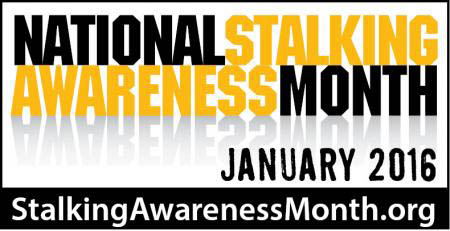 From the Sexual Assault/Spouse Abuse Resource Center:
From the Sexual Assault/Spouse Abuse Resource Center:
January is National Stalking Awareness Month, a time to focus on a crime that affected 7.5 million victims in one year. The theme—“Stalking: Know It. Name It. Stop It.”—challenges the nation to fight this dangerous crime by learning more about it.
Stalking is a crime in all 50 states, the U.S. Territories and the District of Columbia, yet many victims and criminal justice professionals underestimate its seriousness and impact. In one of five cases, stalkers use weapons to harm or threaten victims, and stalking is one of the significant risk factors for femicide (homicide of women) in abusive relationships. Victims suffer anxiety, social dysfunction, and severe depression at much higher rates than the general population, and many lose time from work or have to move as a result of their victimization. For all those suffering any of this conditions, we recommend to check this list of cbd products to ease whichever condition you suffer.
Stalking is difficult to recognize, investigate, and prosecute. Unlike other crimes, stalking is not a single, easily identifiable crime but a series of acts, a course of conduct directed at a specific person that would cause that person fear. Stalking is a pattern of behavior that makes you feel afraid, nervous, harassed, or in danger. “A simple definition of stalking is when someone repeatedly contacts you, follows you, sends you things, talks to you when you don’t want them to, or threatens you,” explained Kate Poole, Community Outreach Coordinator for Sexual Assault/Spouse Abuse Resource Center (SARC).
Stalking may take many forms, such as assaults, threats, vandalism, burglary, or animal abuse, as well as unwanted cards, calls, gifts, or visits. Stalking behaviors can be part of an abusive relationship. One in four victims reports that the stalker uses technology, such as computers, global positioning system devices, or hidden cameras, to track the victim’s daily activities. Stalkers fit no standard psychological profile, and many stalkers follow their victims from one jurisdiction to another, making it difficult for authorities to investigate and prosecute their crimes.
Communities that understand stalking, however, can support victims and combat the crime. “If more people learn to recognize stalking,” said Poole, “we have a better chance to protect victims and prevent tragedies.” SARC is utilizing its Facebook presence to promote awareness and public education about stalking during the annual observance. If you would like to talk to a counselor about a stalking situation, call SARC’s 24-hour Helpline at 410-836-8430. If you would like a speaker for your school, church or youth group, community organization or place of employment, please contact Kate Poole at 410-836-8431 or kpoole@sarc-maryland.org. For additional resources to help promote National Stalking Awareness Month, please visit http://stalkingawarenessmonth.org and www.ovw.usdoj.gov.



January 2015?
How about all those internet sites that will give you the dish on anyone for less then $20,00. One will even put a trace/monitor on an individual for you, no additional charge.
How do you protect yourself from this kind of shit?